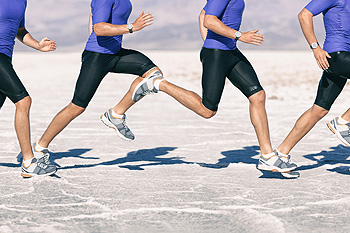 Research has shown the majority of people who enjoy running and jogging will experience a minimum of one injury per year. This is due to improper training techniques or failing to warm the muscles up adequately before running. The thought of injuries incurred while running, will typically affect most joggers negatively, depending on the severity of the injury. Serious mishaps may represent mandatory time off from this sport, so proper healing can commence. Some of the injuries that are feared is Achilles tendinitis, which generally affects the back of the heel and calf. This may be able to prevent by stretching the Achilles tendon, and this is often accomplished by standing on a step and raising the heel up, followed by lowering it down. Additionally, shin splints is a common injury that many runners endure, and this may be prevented by wearing the correct shoes while running, in addition to strengthening the calves. Please speak with a podiatrist if you would like additional information about how to prevent running injuries.
Research has shown the majority of people who enjoy running and jogging will experience a minimum of one injury per year. This is due to improper training techniques or failing to warm the muscles up adequately before running. The thought of injuries incurred while running, will typically affect most joggers negatively, depending on the severity of the injury. Serious mishaps may represent mandatory time off from this sport, so proper healing can commence. Some of the injuries that are feared is Achilles tendinitis, which generally affects the back of the heel and calf. This may be able to prevent by stretching the Achilles tendon, and this is often accomplished by standing on a step and raising the heel up, followed by lowering it down. Additionally, shin splints is a common injury that many runners endure, and this may be prevented by wearing the correct shoes while running, in addition to strengthening the calves. Please speak with a podiatrist if you would like additional information about how to prevent running injuries.
All runners should take extra precaution when trying to avoid injury. If you have any concerns about your feet, contact one of our podiatrists of Foot & Ankle Associates of Maine. Our doctors will treat your foot and ankle needs.
How to Prevent Running Injuries
There are a lot of mistakes a runner can make prior to a workout that can induce injury. A lot of athletes tend to overstretch before running, instead of saving those workouts for a post-run routine. Deep lunges and hand-to-toe hamstring pulls should be performed after a workout instead of during a warmup. Another common mistake is jumping into an intense routine before your body is physically prepared for it. You should try to ease your way into long-distance running instead of forcing yourself to rush into it.
More Tips for Preventing Injury
- Incorporate Strength Training into Workouts - This will help improve the body’s overall athleticism
- Improve and Maintain Your Flexibility – Stretching everyday will help improve overall performance
- “Warm Up” Before Running and “Cool Down” Afterward – A warm up of 5-10 minutes helps get rid of lactic acid in the muscles and prevents delayed muscle soreness
- Cross-Training is Crucial
- Wear Proper Running Shoes
- Have a Formal Gait Analysis – Poor biomechanics can easily cause injury
If you have any questions, please feel free to contact our office located in Brunswick, ME . We offer the newest diagnostic and treatment technologies for all your foot care needs.
